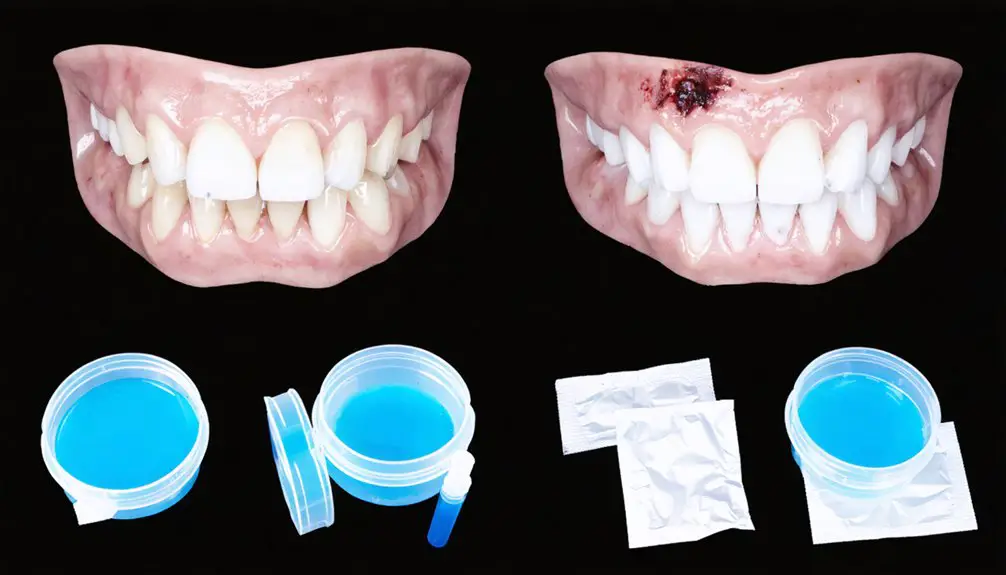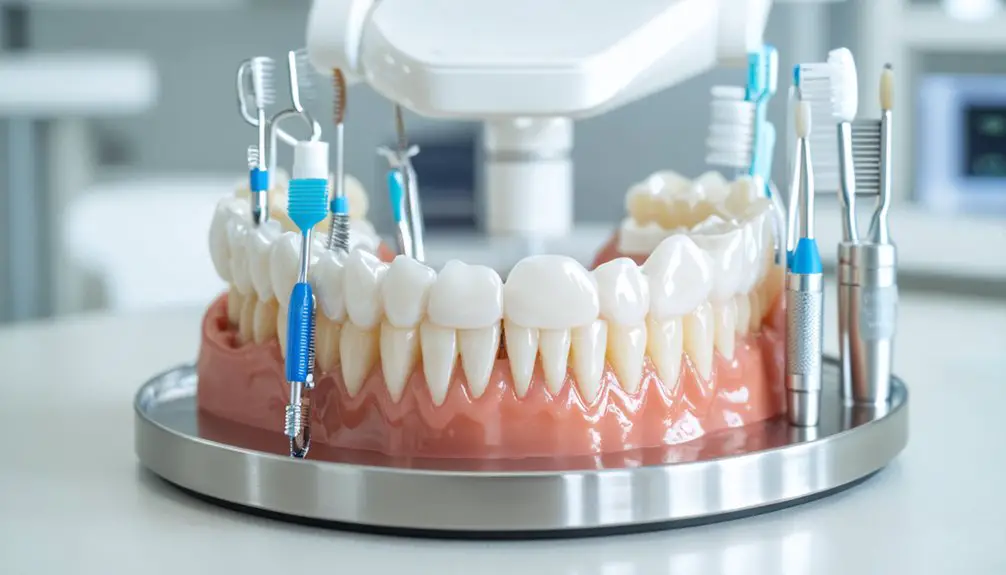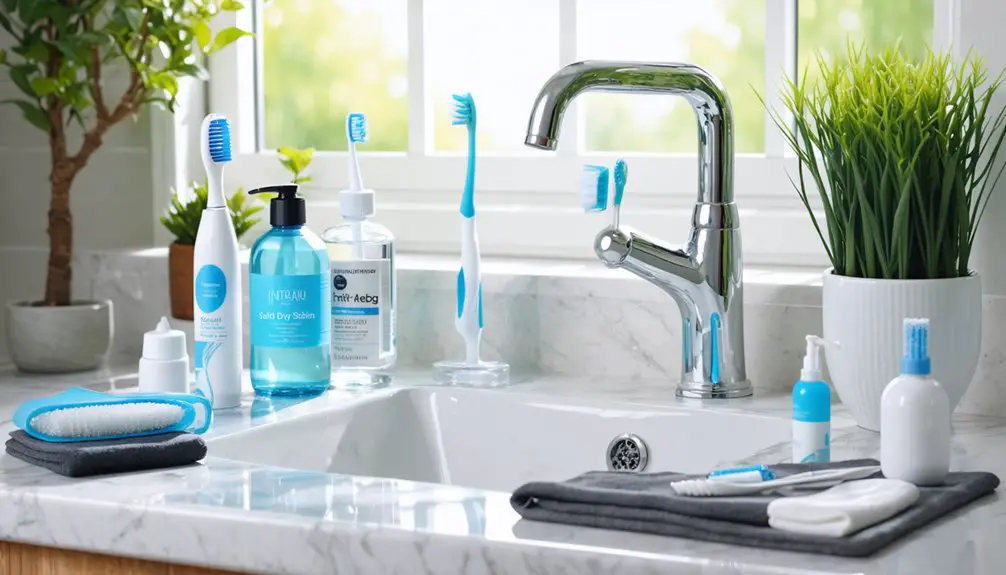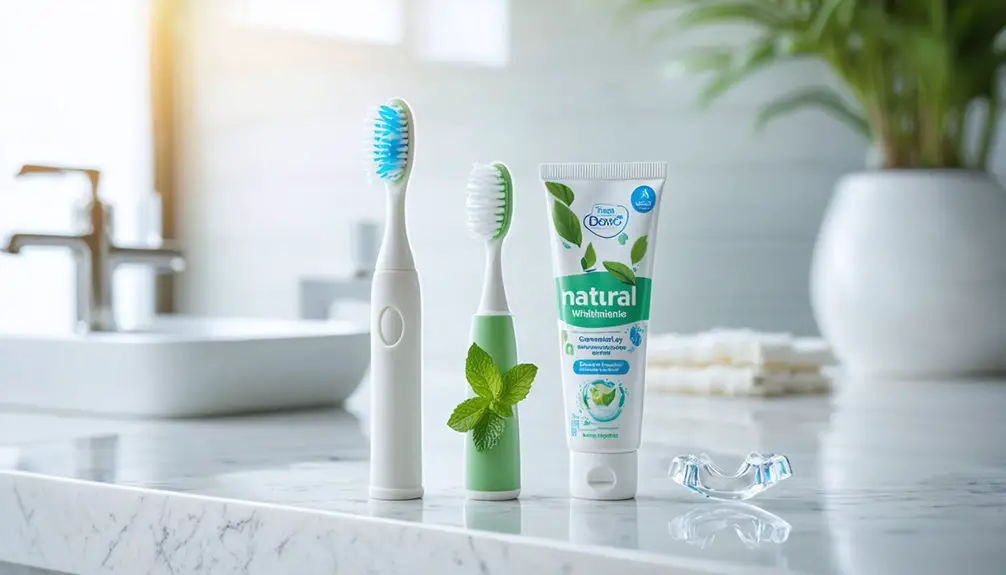Unapproved teeth whitening kits can pose serious risks to your dental health. These products often contain dangerous levels of hydrogen peroxide—up to 300 times the legal limit—which can permanently damage your tooth enamel, cause severe gum burns, and lead to chronic sensitivity issues. You’ll find many sellers making deceptive claims about FDA approval and instant results. To protect yourself and achieve safe, effective whitening, understanding the full scope of these hazards is essential.
Key Takeaways
- Unapproved whitening kits can contain dangerous hydrogen peroxide concentrations up to 300 times the legal limit of 0.1%.
- Excessive use of unregulated whitening products can cause permanent enamel erosion and chronic tooth sensitivity.
- Chemical burns and inflammation of gum tissue may occur from improper application of unauthorized whitening products.
- Counterfeit whitening kits often contain undisclosed harmful substances beyond peroxide that can damage oral health.
- Unlicensed products can cause uneven whitening, structural changes, and irreversible dental damage through repeated use.
The Legal Landscape of Teeth Whitening Products
While teeth whitening products are widely available in the consumer market, their regulatory classification varies considerably based on ingredients and marketing claims.
You’ll find these products regulated as medical devices, drugs, or cosmetics, each with distinct compliance requirements.
Understanding product classification is vital for your safety. LED light systems typically require FDA registration as Class I or II medical devices, while products containing higher concentrations of hydrogen peroxide fall under OTC drug regulations.
Products like GLO Science use hydrogen peroxide gel that’s specially formulated for a pain-free experience. Basic whitening toothpastes and rinses without therapeutic claims follow cosmetic regulations. Misleading claims in marketing materials can result in products being detained at customs.
You should know that most over-the-counter whitening products aren’t FDA-approved, only FDA-registered. This distinction matters because registration merely confirms basic safety standards, not product efficacy.
When choosing whitening products, verify their regulatory compliance to guarantee you’re using legitimate, properly classified items.
Hidden Chemical Hazards in Unapproved Whitening Kits
Because unapproved teeth whitening kits often contain dangerous concentrations of hydrogen peroxide and unregulated chemicals, they pose significant risks to your oral health.
The hidden dangers in these products are alarming – some contain hydrogen peroxide levels up to 300 times the legal limit of 0.1%. These excessive concentrations can severely damage your tooth enamel and burn your gums. Products containing sodium hexametaphosphate can trigger serious cardiac issues.
What’s more concerning is that many retailers don’t disclose their products’ chemical safety information, making it impossible to verify their contents. You’ll find counterfeit kits that may contain harmful substances beyond peroxide. Recent investigations by Which? magazine revealed that the majority of tested products violated safety regulations.
Without professional oversight, you’re exposed to serious chemical hazards including blistered lips, ulcerated gums, and irreversible enamel erosion.
The risks are compounded when underlying dental conditions go undiagnosed before whitening treatment begins.
Long-Term Effects on Dental Health
The long-term effects of unapproved teeth whitening kits can devastate your dental health far beyond temporary discomfort.
When you repeatedly use these products without professional supervision, you’ll face serious risks of permanent enamel erosion and chronic sensitivity issues. The damage progressively weakens your teeth’s natural protective barrier, making them more susceptible to decay and bacterial invasion. Your compromised dental structure may require extensive, costly repairs to restore proper function and appearance. These unsafe products often contain harmful unapproved substances that pose serious health risks. Consulting with a dental professional first is crucial to determine the safest and most effective whitening treatment for your specific needs.
- Weakened enamel becomes vulnerable to acids and bacteria, accelerating tooth decay
- Persistent sensitivity can make eating and drinking uncomfortable or painful
- Gum tissue may sustain chemical burns and inflammation from improper application
- Structural changes can lead to uneven whitening and an unnatural appearance
- Repeated overuse may trigger “bleachorexia,” causing irreversible dental damage
Spotting Deceptive Marketing Claims
Watch for unauthorized FDA approval claims and logos, which manufacturers often use illegally to imply government endorsement.
Since teeth whitening products are classified as low-risk Class I devices, they do not require any FDA approval for sale.
Be skeptical of “limited-time” sales that create false urgency – these typically violate consumer protection laws through continuous discounting schemes.
Social media companies like HiSmile rely heavily on dramatic transformations to showcase their products.
Don’t trust dramatic before-and-after photos or videos that use visual tricks to exaggerate results.
Be wary of influencer endorsements that fail to disclose paid partnerships.
Claims like “instant whitening” or “sensitivity-free” treatment often lack scientific backing.
When evaluating marketing materials, look for specific, substantiated evidence rather than vague promises.
Remember that deceptive advertising frequently overstates product effectiveness while downplaying potential risks and side effects.
Why Professional Treatment Matters
Professional teeth whitening treatments offer significant advantages over unregulated at-home kits, delivering faster and more dramatic results through higher-concentration hydrogen peroxide formulations. Dental experts recommend avoiding over-the-counter products that can lead to uneven whitening results. Having treatment completed by a licensed dental professional ensures optimal safety and effectiveness throughout the process.
Professional whitening treatments outperform store-bought kits, using medical-grade peroxide formulas to deliver superior, faster results under expert supervision.
The professional benefits extend beyond just whiter teeth, as dentists provide thorough care that guarantees treatment safety and best possible outcomes. Under professional supervision, you’ll receive customized treatment plans tailored to your specific needs, along with expert monitoring to prevent complications.
- Achieve up to 8 shades lighter in a single 1-2 hour session
- Receive protection through pre-treatment dental examinations
- Benefit from custom-fitted trays that prevent gel leakage
- Get immediate professional assistance if sensitivity occurs
- Experience longer-lasting results with proper maintenance guidance
Taking Action Against Illegal Products
You can protect your community from dangerous teeth whitening products by reporting suspicious sellers to regulatory authorities like the OPSS and dental governing bodies.
Consider organizing local awareness campaigns to educate others about the risks of unregulated whitening kits and the importance of professional dental treatment.
Your vigilance and community engagement will help prevent illegal products from harming unsuspecting consumers while supporting legitimate dental practices.
Report Suspicious Sellers
Taking action against illegal teeth whitening products starts with reporting suspicious sellers to the appropriate regulatory bodies.
Through proper reporting procedures and consumer education, you can help protect others from dangerous whitening treatments that exceed legal hydrogen peroxide limits or are provided by unregistered practitioners.
- Report non-registered practitioners performing whitening services to the General Dental Council (GDC)
- Submit evidence of products containing over 0.1% hydrogen peroxide to Trading Standards
- Alert the Office for Product Safety and Standards (OPSS) about suspicious online marketplace listings
- Document and report any damage or adverse reactions from illegal whitening products
- Forward evidence of improperly labeled products or those failing to declare chemical contents to relevant authorities
Organize Community Awareness Campaigns
While reporting suspicious sellers helps combat illegal whitening products individually, organizing community awareness campaigns creates broader impact through collective education.
Through community partnerships with dental boards, health departments, and regulatory agencies, you’ll strengthen your campaign’s credibility and access expert resources.
Implement awareness strategies across multiple channels, including social media outreach with dental professionals, interactive workshops, and public seminars.
You can host events at community centers and schools to demonstrate safe whitening practices and distribute validated educational materials.
Consider partnering with qualified influencers to counter misleading beauty industry marketing and reach younger demographics most attracted to whitening treatments.
Track campaign effectiveness by monitoring complaint patterns and emerging trends, allowing you to adjust your educational approach and protect more consumers from dangerous illegal products.
Frequently Asked Questions
How Long Should I Wait Between Teeth Whitening Treatments?
Like delicate pearls needing rest, you’ll want to space your whitening treatments: 6-12 months for professional sessions, 3-6 months for at-home kits, or 2 months for OTC products to prevent teeth sensitivity.
Can I Eat or Drink Immediately After Using Whitening Products?
You shouldn’t eat or drink anything except water for 24-48 hours after whitening. Your teeth’s immediate effects include open enamel pores that can easily absorb stains, compromising whitening safety and results.
Are Natural Teeth Whitening Alternatives Like Charcoal and Baking Soda Safe?
Charcoal’s effectiveness isn’t proven and may damage your enamel, while baking soda’s safety is better when used sparingly. Neither should replace your fluoride toothpaste. Consult your dentist before using these alternatives.
Will Teeth Whitening Work on Dental Crowns or Veneers?
No, teeth whitening won’t work on your crowns or veneers. These dental restorations are made from non-permeable materials that don’t respond to bleaching agents like natural tooth enamel does.
At What Age Is It Safe to Start Teeth Whitening Treatments?
Like newly formed pearls, your teeth need time to mature. You shouldn’t begin whitening until age 14-15 when dental age is appropriate, preventing teeth sensitivity and ensuring full enamel development.
References
- https://thames-dental.co.uk/dangers-unregulated-teeth-whitening-products/
- https://www.bda.org/media-centre/dentists-and-which-warn-of-risks-from-buying-teeth-whitening-products-online/
- https://www.orchardscottsdental.com/the-hidden-dangers-of-otc-teeth-whitening-what-to-know/
- https://www.nhs.uk/tests-and-treatments/teeth-whitening/
- https://www.dentalhealth.org/news/the-definitive-guide-to-illegal-tooth-whitening
- https://www.registrarcorp.com/blog/medical-devices/medical-device-regulations/fda-compliance-for-fluoride-whitening/
- https://metropolitandentalarts.com/beyond-the-hype-is-glo-whitening-fda-approved/
- https://www.cadentalgroup.com/what-you-need-to-know-about-teeth-whitening-and-the-fda/
- https://gloscience.com/blogs/blog/does-the-fda-approve-teeth-whitening-products
- https://www.accessdata.fda.gov/cdrh_docs/pdf11/K110888.pdf



